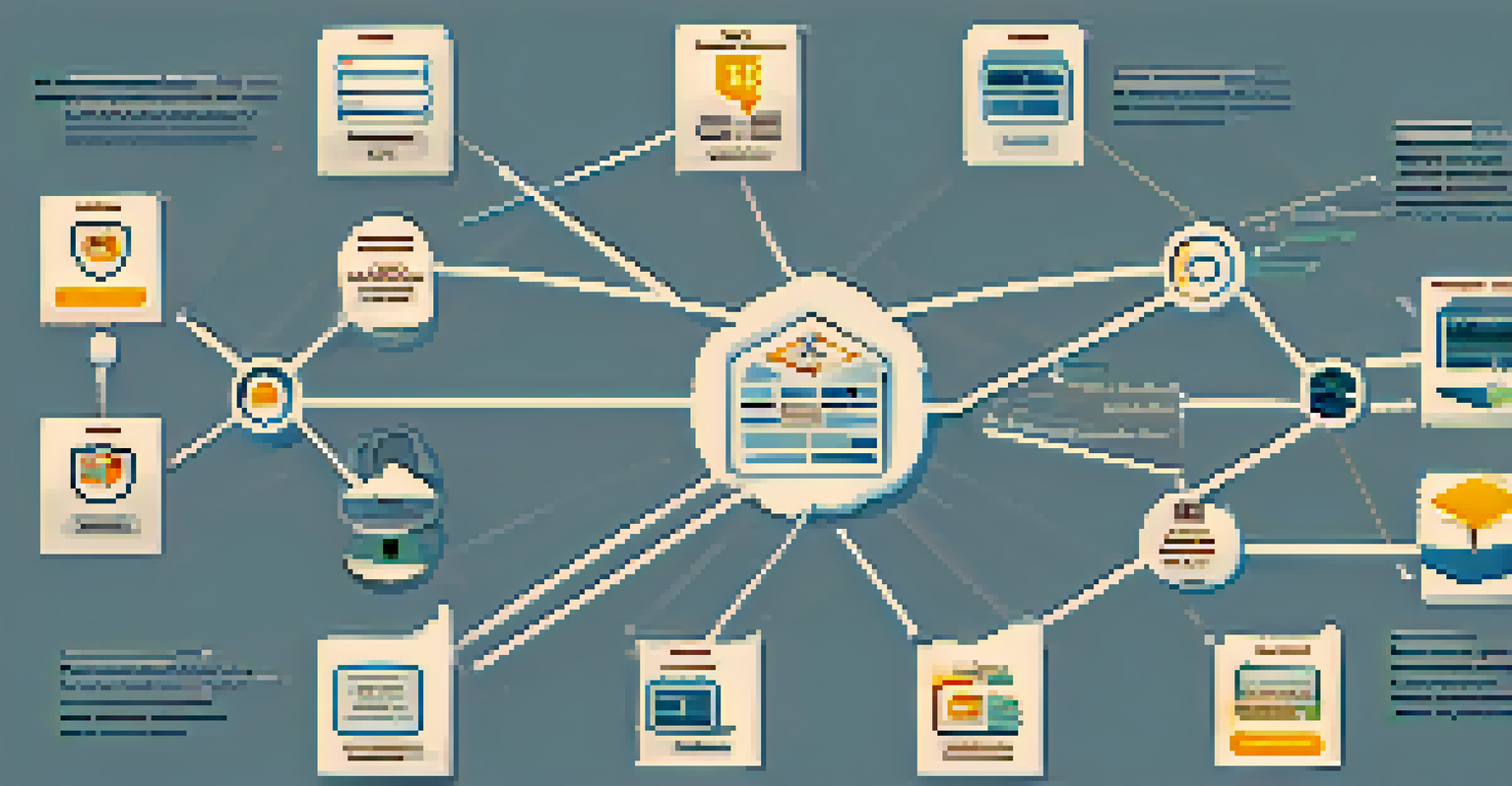Identity Verification Challenges Addressed by Bitcoin Technology

Understanding the Basics of Identity Verification
Identity verification is a crucial process that ensures individuals are who they claim to be. It plays a significant role in various sectors, from banking to social media, where trust is paramount. Traditional methods, such as presenting ID cards or answering security questions, can be cumbersome and sometimes insecure.
In a digital world, identity is the new currency, and we must protect it as fiercely as we protect our finances.
In an increasingly digital world, these traditional methods often fall short, exposing users to fraud and identity theft. With the rise in online transactions, the need for robust identity verification systems has never been more pressing. This is where Bitcoin technology steps in, offering innovative solutions.
By utilizing decentralized systems, Bitcoin can provide a more secure way to authenticate identities without relying on central authorities. This shift not only enhances security but also simplifies the process for users, making it a win-win situation.
The Role of Blockchain in Identity Verification
At the heart of Bitcoin technology lies blockchain, a decentralized ledger that records transactions across many computers. This technology enables transparency and immutability, meaning once data is added, it cannot be altered. This characteristic is particularly valuable for identity verification, as it ensures the integrity of identity data.

Instead of relying on a single database that can be hacked or manipulated, blockchain distributes the data across a network. This decentralization reduces the risk of identity theft, as there is no central point of failure. Users can have greater confidence in their identities being protected.
Enhanced Security with Blockchain
Blockchain technology provides a decentralized and immutable record of identities, significantly reducing the risk of identity theft.
Moreover, blockchain allows for the creation of digital identities that are unique and verifiable. These identities can be securely shared with trusted entities, streamlining the verification process without compromising user privacy.
Enhancing Privacy through Decentralization
One of the most significant challenges in identity verification is maintaining user privacy. Traditional systems often require extensive personal information, which can lead to data breaches. Bitcoin technology addresses this concern by allowing users to control their own identity data.
The blockchain is the technology that will change the way we trust each other.
With decentralized identity solutions, individuals can share only the necessary information without exposing their entire identity. For example, a user might only need to prove they are over a certain age without revealing their full birthdate or other sensitive details. This not only protects personal information but also enhances user trust.
The ability to manage privacy effectively encourages more people to engage with digital platforms. When users feel secure about their information, they are more likely to participate in online transactions and services, benefiting both customers and businesses.
Reducing Costs in Identity Verification Processes
Traditional identity verification methods can be costly, involving fees for background checks, document processing, and labor. By leveraging Bitcoin technology, organizations can streamline these processes and significantly reduce costs. The use of automated systems powered by blockchain can eliminate many manual steps involved in verification.
For instance, businesses can utilize smart contracts—self-executing contracts with the terms directly written into code—to automate identity verification processes. This not only speeds up the process but also minimizes the need for third-party intermediaries, further cutting costs.
Privacy Control for Users
Decentralized identity solutions allow users to share only necessary information, protecting their personal data from breaches.
Ultimately, reduced costs in identity verification can lead to more accessible services for consumers. Lower fees may translate to better pricing for customers, making essential services more affordable and fostering greater financial inclusion.
Building Trust with Immutable Records
Trust is an essential element in identity verification, and Bitcoin technology helps foster this trust through the use of immutable records. Once information is recorded on the blockchain, it cannot be changed or deleted, creating a permanent, tamper-proof history. This feature is crucial for building confidence in identity verification processes.
Organizations can rely on these immutable records to verify the identities of users without fear of manipulation or fraud. For instance, a bank could confirm a customer's identity based on their unalterable transaction history on the blockchain. This level of reliability enhances security for all parties involved.
As trust becomes more tangible, users are likely to feel more secure when engaging in online interactions, leading to increased participation in the digital economy. Trust in identity verification not only benefits individuals but also strengthens the overall ecosystem.
Addressing Regulatory Challenges with Bitcoin Solutions
Regulatory compliance is another significant challenge in identity verification, as organizations must adhere to stringent laws and regulations. Bitcoin technology can help navigate these complexities by providing transparent and verifiable records of identity data. This aligns with the requirements set forth by regulatory bodies.
By utilizing blockchain for identity verification, organizations can easily demonstrate compliance with regulations such as Know Your Customer (KYC) and Anti-Money Laundering (AML). The ability to provide verifiable proof of identity without storing sensitive information on centralized servers is a game changer.
Cost-Effective Identity Verification
Utilizing Bitcoin technology can streamline identity verification processes, leading to reduced costs and greater accessibility for consumers.
This not only reduces the administrative burden on organizations but also assures regulators that proper identity verification processes are in place. As businesses adopt Bitcoin technology, they position themselves as responsible players in the digital landscape.
The Future of Identity Verification with Bitcoin Technology
As we look to the future, the potential for Bitcoin technology in identity verification is immense. With ongoing advancements in blockchain and decentralized identity solutions, we can expect a shift towards more secure and efficient verification processes. This evolution will likely reshape how we think about identity in the digital age.
Imagine a world where users can verify their identity seamlessly across platforms with a single digital credential. This could eliminate the need for multiple passwords, improve user experience, and enhance security. It’s a vision that Bitcoin technology is actively working towards making a reality.

In conclusion, the challenges of identity verification present opportunities for innovation. By harnessing the power of Bitcoin technology, we can create a more secure, efficient, and user-friendly identity verification landscape.